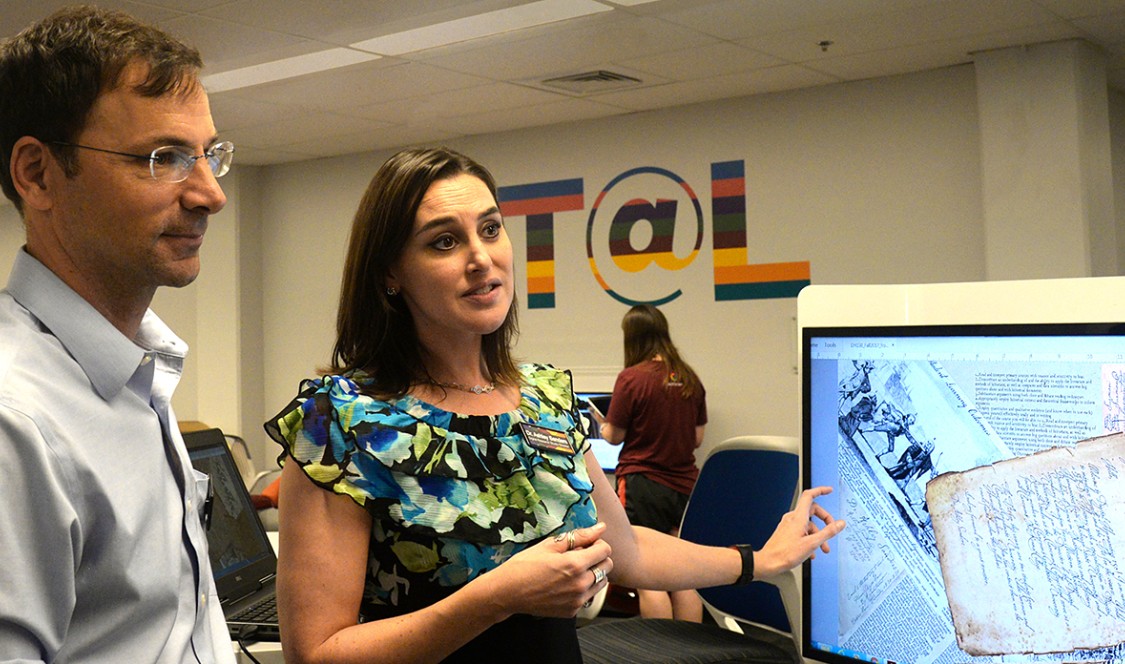The Taxila archeological site lies in perilous territory in northwest Pakistan. So even the best-connected researchers wishing to explore the ruins seldom make the trip. For an undergraduate, the risk and expense would be unthinkable.
Now, Claremont Colleges students can do the next-best thing: through a new Digital Humanities initiative, inaccessible sites like Taxila can be explored virtually on computers in Honnold Library.
CMC Prof. Daniel Michon and his student research team virtually recreated the city using digital mapping software to bring hand-drawn maps and archeological logs to life.
“There are thousands of archaeological manuscripts of different sites around the world catching dust somewhere,” said Michon, an Associate Professor of Religious Studies. He believes that Digital Humanities, an emerging interdisciplinary field, can turn those books into three-dimensional representations that can be explored on a computer screen. A student can enter a specific room or walk a pathway in Taxila, much like its citizens did in 3,360 BCE.
“Now you’re able to search through each level of the city for individual objects,” Michon said. “Take gold for example, all of the gold discovered at the site is displayed in one section of a manuscript, but that’s not how gold was placed around the city.”
Digital Humanities uses computer science techniques like data analysis and programming for humanities research. Michon's research specialty is the religious history of South Asia, but his team consists of Computer Science majors.
Michon serves as the faculty director of a $1.5 million Andrew W. Mellon Foundation grant with Ashley Sanders, director of The Claremont Colleges’ Digital Research Studio. The Claremont University Consortium used the grant, first received in 2014, to develop the Digital Humanities program.
To create a project, students start in Sanders’ “DH Studio” course. The course introduces methods for integrating humanistic inquiry and historical research with computer science and data science. By design, the course is also highly collaborative — humanities and social science students work with computer science students to learn computation skills like data mining and machine learning while they analyze 18th century texts.
One of Sanders' students even converted the course descriptions and syllabus into an interactive document in the style of an 18th century transcript.
“Now most of my students actually read the course outline,” Sanders said.
Like Michon and Sanders, CMC Prof. Jonathan Petropoulos used his portion of the grant to develop an interdisciplinary course. Students in his “Museums and Leadership” class will build and maintain a virtual art museum using the digital-archiving platform Omeka.
“I was impressed by how quickly my students mastered the technology and realized their visions,” Petropoulous said.
Petropoulos, the John V. Croul Professor of European History, planned his course with public policy in mind. When students finish their projects, they will have designed the spatial and contextual specifications of the museum from top to bottom, acting as curator, architect, director, and trustee.
Overseeing a museum gives valuable insight on how policy shapes space, Petropoulos said, skills that can carry into careers in government, business, and public policy.
Although digital humanities is revolutionizing the academic landscape, it is still a relatively new discipline. Prof. Sanders believes CMC and Claremont Colleges undergraduates may soon be publishing work with their professors in digital humanities and disciplinary journals.
—Ahmed Bilal ’19 and Michael Tesauro

